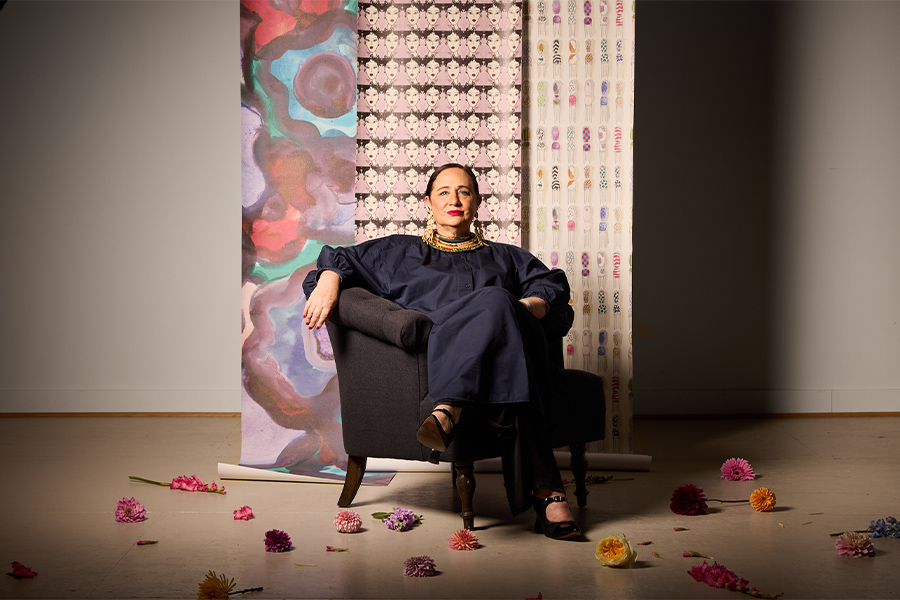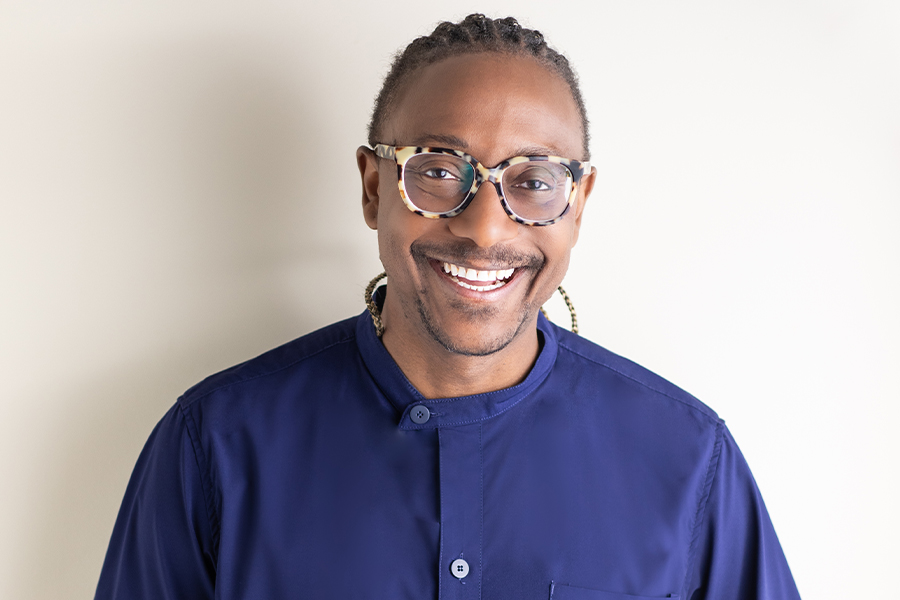Rocco Forte, born to Italian parents and raised in England, grew up immersed in hospitality. His father, Lord Charles Forte, built a vast empire spanning hotels, catering, and restaurants, where Forte himself spent school holidays working, gaining hands-on experience in the family business.
He stepped in as CEO in 1983 and as chairman by 1992. But in 1996, the Forte family lost control of the company through a hostile takeover by British media conglomerate Granada.
That same year, determined to create something new, Forte established Rocco Forte Hotels with his sister Olga Polizzi, who now serves as director of design.
Their first acquisition was the Balmoral in Edinburgh in 1998. Two years later, Forte seized an opportunity to buy back one of the family’s original properties from Granada.

Playful textures meet Art Deco moments in Bar Magritte in the Hotel Amigo in Brussels, designed in collaboration with DO Design Studio
Supported by family capital and an unexpected loan from the Bank of Scotland, Forte acquired the 19th-century building in Rome, initially designed by architect Giuseppe Valadier, which had been converted into an office space for an Italian TV channel. He returned it to its former glory as the luxurious Hotel de Russie. By 2001, in an effort to settle the takeover tensions, Forte regained rights to the Forte trademark.
Today, Rocco Forte Hotels is a premier collection of 14 properties across six countries, with five more in development. The group recently debuted Rocco Forte House in Milan, offering serviced apartments within a 19th-century palazzo designed by Paolo Moschino in collaboration with Polizzi. In a strategic move aimed at fueling further growth, it also sold a 49 percent minority stake of the company to Saudi Arabia’s Public Investment Fund (PIF) earlier this year.
Here, the former triathlete reflects on the family’s journey, the brand’s expanding portfolio, and the exciting path forward.
How did you get into hospitality?
Rocco Forte: My father came to England when he was 3 years old with his father, and my mother was born in England to Italian parents who came after the First World War. I always say that my Italian exuberance is tempered by my British upbringing. After university, I became a chartered accountant, but all I wanted was to go into my father’s business. He developed quite an enormous company, which was in hotels, catering, in-flight catering, industrial catering, roadside restaurants, and upmarket restaurants. The hotels ranged from the budget Travelodge to the [luxury] George V in Paris.

The Tommaso Ziffer-crafted Julep Print Room in the Hotel de La Ville in Rome, an ode to the 19th-century quasi-collage wallpaper technique popular in England
What was it like to succeed your father as chairman?
RF: The only difficult time I had with my father was when it was time to take over. When you’re a founder of a business, the most difficult thing to do is let go. I was anxious to transform the business and drive it forward. He didn’t want to sell anything, [but I wanted to sell so I] could invest the money in something more appropriate for us. We had a difficult few years. He sat me down three times, and I resigned each time. Having been on the receiving end of a father-son relationship, it’s softened the way I work with my children. We have a very open and friendly relationship.
What did you learn from your father?
RF: I learned a lot. What he achieved is in many ways mind boggling. He believed in treating staff, suppliers, and customers with integrity and I’ve taken that through my life. He was someone who never took no for an answer. If he wanted to do something, he’d try to find a way to do it, even if everybody said it was impossible. He also had a great ability with people.

Studio Ziffer adorned the lobby at the Hotel de Rome in Berlin with oversized sofas and plants
In 2000, you bought back one of your family’s original properties from Granada after its takeover of Forte Group and turned it into a luxury hotel. Why was that important to you?
RF: It was originally called the Hotel de Russie because it had an imperial Russian clientele when it first opened. It had become the head offices of Italian TV station RAI, and then laid empty for eight years. It’s in the center of Rome, and from the street, you don’t realize what is behind. You go into this wonderful courtyard with a huge garden rising up above Villa Borghese, a big park in Rome. I persuaded the owners to allow me to turn it into a hotel, and it was a huge success. I had to pay to turn it into a hotel, and it cost me $15 million at that time. I managed to repay the bank in three years, so that shows how successful it was.
What has been the impact of working with Saudi Arabia’s PIF, which acquired a minority stake in the company for $741 million this year?
RF: They are obviously powerful partners to have. They have a long-term vision as we do, and they’ve raised our profile across the world, particularly with developers. They also injected some money into the company as part of the deal, and that gives us a lot more flexibility for expansion than we had before. This winter, we’re spending $45 million, which is more than twice as much as we’ve spent in the past. We’re bringing all our properties up to date, and we have a pipeline of five hotels at the moment.

The front hall in Brown’s Hotel in London boasts handpainted wallpaper depicting whimsical wisteria created by artist Adam Ellis
Along with your sister Olga Polizzi, your adult children also work at the company. What is it like running the business as a family?
RF: Olga and I work well together, and it’s been marvelous because she’s a very special person. As for my children, I’ve always believed in giving them an element of responsibility so they can make mistakes as well as build their confidence. We have very good relationships. One of the nice things about having kids in their 30s working in your business is that you get to see them a lot. They also understand who we are, our passion for the business, and how much we care about the service we give to the customers. There’s a different feeling—they’re not working for an amorphous organization, they’re working for real people who care and give them guidance to deliver the service we have to give our customers.
What have been some of the challenges you’ve faced?
RF: The financial crisis was a very difficult period. We had a lot of debt and the banks aren’t very nice when things are going wrong. They wanted to be repaid, so I sold our hotel in Geneva, [which allowed us to] do a deal with the bank to take us forward.
Then there was Covid, which was a matter of survival and trying to keep teams together. There were various forms of furlough in all the countries we operated, so we were able to keep a large part of the staff on board. In some cases, we topped up wages of paid staff to help them because the government subsidy wasn’t quite as much as what they were earning. We managed to survive and things improved rapidly after. In fact, our profits in 2023 were almost double what they had been before Covid.

The Hotel Savoy in Florence features signature prints by Laudomia Pucci and Olga Polizzi
What does your pipeline look like today?
RF: We’re principally in Italy, so there’s momentum here. Next year, we’re opening in Naples and Milan. We opened Rocco Forte House serviced apartments this September. In Noto, there’s an 18th-century palazzo that was recently restored, which we’re turning into a luxury hotel. It will have 30 keys so it’s quite small, but it fits well into Noto. We’re also starting to look further afield. I’d like to be in the States.
What’s one of your greatest lessons learned as a business leader?
RF: You need to delegate and give people the authority to get on with things. Communication can’t be from up to down—it also has to be from down to up. That’s the way people at the top know what’s going on in the business. It’s important to have a relaxed flow of communication between [each] layer as well as complete trust in each other. Otherwise, it doesn’t work.
Looking ahead, what’s next for you and the company?
RF: My main focus now is in strengthening the whole organization, what I call the engine room, so that we can grow more quickly and effectively, and so the business is less reliant on me than it has been in the past. That’s my principal role for the next five years. Obviously a deal is important, but I get excited about fine-tuning my organization. If you don’t keep looking forward, then it’s over. I’m still ambitious about the business, and I still have a lot of energy.

Le Jardin in the Hotel de Russie in Rome is surrounded by mature pines and flowering citrus
This article originally appeared in HD’s November 2024 issue.


